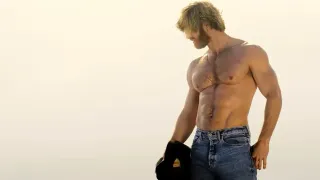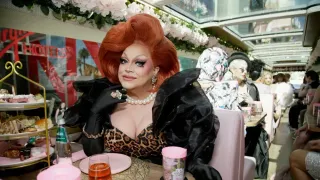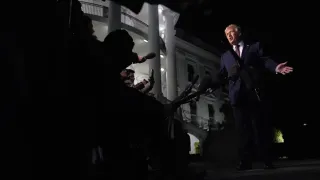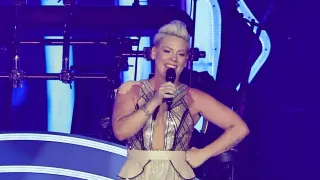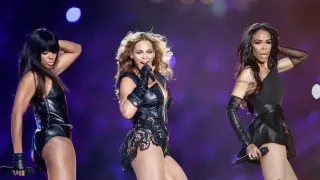April 15, 2025
EDGE Interview: Writer/Director Tracie Laymon Lays Out a Platform for Communicating with Chosen Family in 'Bob Trevino Likes It'
Matthew Creith READ TIME: 8 MIN.
"Bob Trevino Likes It" stars Barbie Ferreira as Lily Trevino, a people-pleasing young woman whose fractured relationship with her cold and distant father, Bob (French Stewart), leaves her feeling alone. With no family to turn to, Lily strikes up a friendship with a man on Facebook also named Bob Trevino (John Leguizamo). Their seemingly bizarre relationship is explored in great detail as Lily becomes addicted to posting on social media just so her new friend would "like" her posts... leading her to enjoy seeing her father's name validating her life.
Uncommon friendships are nothing new for the dramedy film genre, but "Bob Trevino Likes It" is much different. Outstanding performances from several actors playing against type made the film a standout when it won the Grand Jury Award at the South by Southwest Film Festival in 2024. Writer and director Tracie Laymon spent many years honing her craft as a filmmaker while living in Austin, Texas before debuting this movie there.
Laymon based her latest film on a real-life experience she had connecting with someone on the internet with the same name as her father. Though the bulk of "Bob Trevino Likes It" is a fictional story, true-to-life elements are built into every frame of Laymon's fantastic portrayal of chosen family. EDGE caught up with Laymon to discuss "Bob Trevino Likes It," her personal journey in translating some real events to the screen, and what makes chosen family more unique than the biological family someone is born into.
EDGE: "Bob Trevino Likes It" premiered at SXSW and had such a tremendous reception at the festival. I lived in Austin for many years as I know you did as well. What was the feeling like to debut this film in a city you spent formative years in?
Tracie Laymon: So cathartic. It's validating, but not in an ego driven way. Just to come back home, to be in the place where I was as a young filmmaker, looking at a stage where all these amazing filmmakers had stood and inspired me, and feel like I was up there talking to people that hopefully I could inspire. It was really a full circle moment.
EDGE: Without giving away too much for those that haven't had a chance to see "Bob Trevino Likes It," you evidence your personal experience with this premise at the end of the film. Can you start by telling me a bit about your personal journey and what inspired you to write and direct "Bob Trevino Likes It"?
Tracie Laymon: The movie is a work of fiction, but it's inspired by true friendship and a true situation in my life. My dad was upset with me and he wouldn't email me back, wouldn't call me back. I put his name into Facebook thinking maybe he's on Facebook because I wanted to fix it. I accidentally friended another man with his name. But the surprising thing was how the "likes" and the comments were healing, because they were coming from my dad's name. I mean, I knew it wasn't my dad, but it was this kind stranger in Wichita, Kansas, who was just being kind for the sake of being kind. I wasn't really used to that, like a father figure type, an intergenerational friendship where someone wasn't like me or there was nothing nefarious going on. It was just literally for the sake of being kind and so over time it really helped me heal. Then I thought, "well, I need to share the story." The real story is not as cinematic, but I tried to be very true to my emotional journey and the things I'd gone through. I felt like I kind of owed it to people to tell this story because it's proof that small acts of kindness matter.
EDGE: It's got to be such a dopamine hit to see your dad's name, even though it's not your dad...it's a little validating, I imagine.
Tracie Laymon: Yeah, definitely. First it starts kind of like a dopamine hit. You're like, "Okay, I need that." Over time, it sort of filled a void. I really thought that I'd been abandoned. I'd been rejected because my dad wasn't really giving me these types of acknowledgements, or wasn't reaching out or asking how I was or things like that, necessarily. For example, all nine years, my dad never said happy birthday to me, but every year, like clockwork, I would get my dad's name saying "Happy Birthday" from the stranger in Wichita, Kansas. If you can imagine what that's like for someone that isn't getting that, it really does over time validate that maybe there's a world in which I'm not abandoned and rejected.
EDGE:As both the writer and director, how did you navigate the dual responsibility of telling your story while also guiding the film's visual and emotional direction? How did you balance authenticity with dramatic storytelling?
Tracie Laymon: I did a lot of listening. I did a lot of choosing the right people. You cast the cast, but you also cast the crew. Bringing everybody in that I felt could relate in some way to the story, and they would bring their truth as well. Even if the situation was fiction, we were bringing all our collective truths in a way that I took different parts of my own life as well. There are the parents who are grieving the loss of a child in the story. I had friends who had gone through that, and I asked them to read the screenplay and tell me if I've honored this part of the story. Every piece of the story, I tried to get feedback or real life situations so that I could know that these weren't just characters. They were real people. That they represented real people and real traumas and real healing as well.
EDGE: Barbie Ferreira is fantastic in this film. I couldn't believe the range she has in playing such an emotionally complex character who starts out as a bit of a loner and transforms because of John Leguizamo's character's influence. Truly amazing. The film touches on some profound themes like loneliness, identity, personal growth, and self-acceptance. What message do you hope to convey through these themes, and how do you want audiences to relate to these two surprising characters?
Tracie Laymon: You just summed it up! I think one thing is that a lot of us that grow up in these situations, we forget to be kind to ourselves. Be kind to everybody but we forget that we're part of everybody. Sometimes taking care of yourself means not having certain people close to you. That's a hard thing for somebody that grew up a people pleaser, grew up thinking that they needed to fix everything. This movie, in a way, is about learning. Learning to let go of the people that continually hurt you and to make room for the people that want to love you, because we only get one life.
The movie clearly says that when you love someone, you don't just abandon them. If someone's treating you like that, just try hanging out with them a little less. If you see someone that may not look or seem like the person that you thought would see you and love you, but they make you feel seen and heard and valued, there's something beautiful happening there. If you're just open to it, maybe it's not your biological relative, maybe it's a neighbor or a friend, or friends that become family. I think we also forget that. Pay attention to how you feel. If you're lucky enough to have an amazing biological family, that's great. But even then, you're not limited to them. Your friends can become your family. The world is so big, and if we just see everybody as potential family, then maybe we could treat each other a little better, and we could start to realize we're not all so different. We all belong.
A lot of times people think a romantic partner is everything, but it's like, no, they're not actually everything. You can have a love story with your friends. I feel like this movie, in a way, is a love story about a father and a daughter, basically a chosen father and a chosen daughter and so treat your friends you know with the kind of love that you would treat your family or your spouse.
EDGE: A lot of our audience is part of the LGBTQ+ community, and chosen family is such a huge part of my life and a lot of people that I know. It's very interesting to watch a story that is about chosen family, that's a pseudo father/daughter relationship versus just friends. The gay community often looks at friends as just chosen family. Was that any part of the script writing process for you that you specifically honed in on that father/daughter type of chosen family relationship, instead of giving this character that Barbie plays a romantic partner?
Tracie Laymon: I wanted to keep it clean in a way, because I thought if we can see her as a human being first, then if she goes on to have a relationship in the sequel, I didn't want to sexualize her in a situation where it would cause us to project with the father. I just thought, "let's keep it clean," because also, she's not really ready for a relationship. Let's be honest. She has to heal some things first. I think she does have a love story with her roommate, a platonic love story. I think, for me, I was someone that felt like I didn't belong. I felt like an outsider. For so long, I just wanted to find these pockets, and I wanted to be seen. I didn't want to be just looked at or valued because of the way that I looked. I wanted to be seen inside. Part of this movie, for me, is seeing everybody for who they are on the inside and valuing that. Then what comes from that is an expression from that core versus outside in.
EDGE: What do you hope the lasting impact of "Bob Trevino Likes It" will be for those who watch it, especially for those who might see parts of their own lives reflected in Lily and Bob's story?
Tracie Laymon: Healing and friendship and family can come in unexpected ways. If we can just be a little more open, then we might find what we're looking for. We all belong and matter. We have power. We're being told every day we're all divided and we're being shown all these things to make us feel powerless and afraid. The fact is that we have great power, and these small acts of kindness do matter. Whether it's helping your neighbor bring in groceries or sticking up for somebody you don't know. If we all just did a little bit all together, it has great power. Even your small acts alone have a ripple effect that you have to have faith that it continues. Literally, you and I wouldn't be talking unless a stranger had been kind to me on the internet. He never knew the effect that he had on my life. So you just never know. But you have to have faith.
